"How To Be An Ally": People With Disabilities And Disability Advocates Are Sharing How We Can Make Work More Inclusive
People with disabilities can face a variety of challenges in workplaces that aren't designed for them, but accommodations and awareness can make a huge difference. October was Disability Employment Awareness Month, but we should all work year-round to make sure our workplaces are safe, accessible, and anti-ableist.
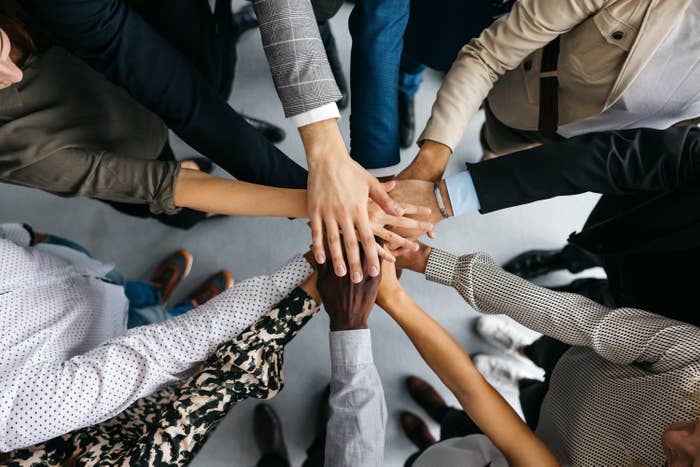
At the same time, disability is in the headlines as people discuss Lt. Governor John Fetterman's performance in Pennsylvania's Senate debate — and frankly, the discussion around this shows how far we still have to go in understanding and accommodating disability. Disability advocates argue that Fetterman's use of closed captions should be no more controversial than other accommodations like wearing glasses, but this conversation has exposed some uncomfortable biases that people carry around disability.
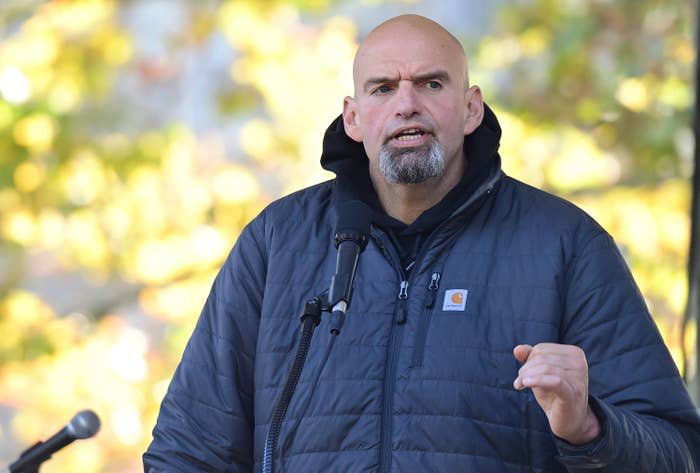
Fetterman experienced a stroke in the spring that he is still recovering from, which resulted in an auditory processing disorder. He uses a closed captioning device as an accommodation.
So how can we be better allies? Well, on LinkedIn, people with disabilities and disability advocates have been sharing steps we can all take to make every workplace accessible for all. Here's what they had to say:
1.Marisa Hamamoto, a stroke survivor and founder of Infinite Flow Dance, shared her thoughts on how to be an ally to the disability community. "I am a stroke survivor with a couple of invisible disabilities. Disability is part of my identity, just like I am Japanese American, female, and a dancer. I’ve worked with thousands of disabled people through my work Infinite Flow Dance."
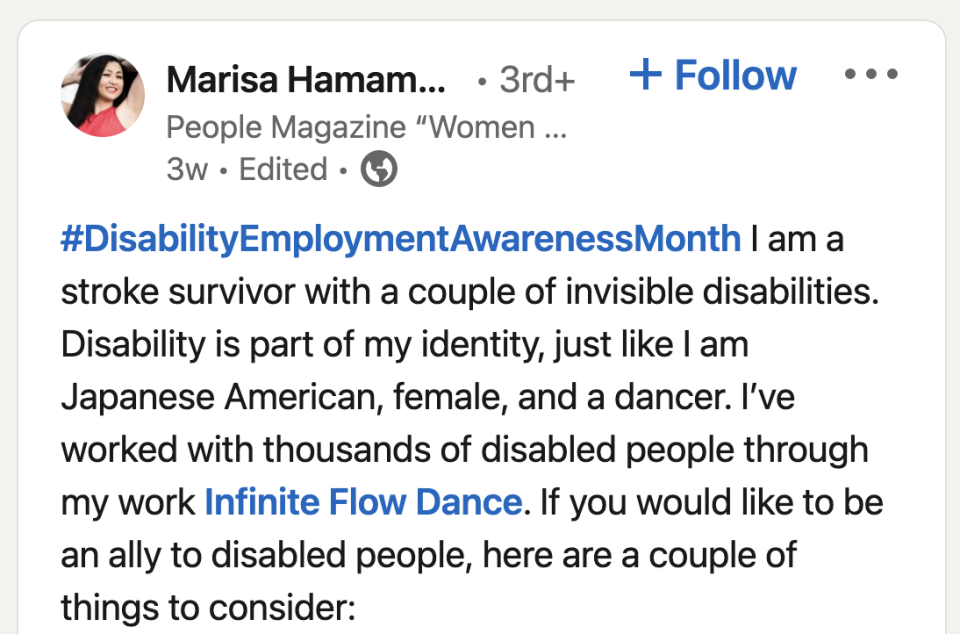
"If you would like to be an ally to disabled people, here are a couple of things to consider:
1) 'Disability' is not a bad word. Don’t use fabricated labels such as 'differently abled,' 'special abilities,' etc. Just use 'disability.' In fact, there is an army of folks who consider themselves disabled and proud.2) 1 in 4 Americans, that is 61 million Americans and 1.7 billion people globally, are disabled. 70-80% of disabled people have invisible or nonobvious disabilities. Don’t make assumptions.3). Because this world was not built for disabled people, people with disabilities have had to hack their lives to make life work, so many of us are used to coming up with creative non traditional solutions. Invite disabled people to the table. They will add to the diversity of thought.Whoever is reading this: Disabled or not, your BODY belongs on this planet ❤️🦋."
2.Tiffany Yu, CEO of Diversability, shared her answer to the question How should my company recognize Disability Employment Awareness Month? Spoiler alert: It's gotta be year-round. Yu writes, "Hire disabled people. Pay them equitably. Hire more disabled people. Promote them."
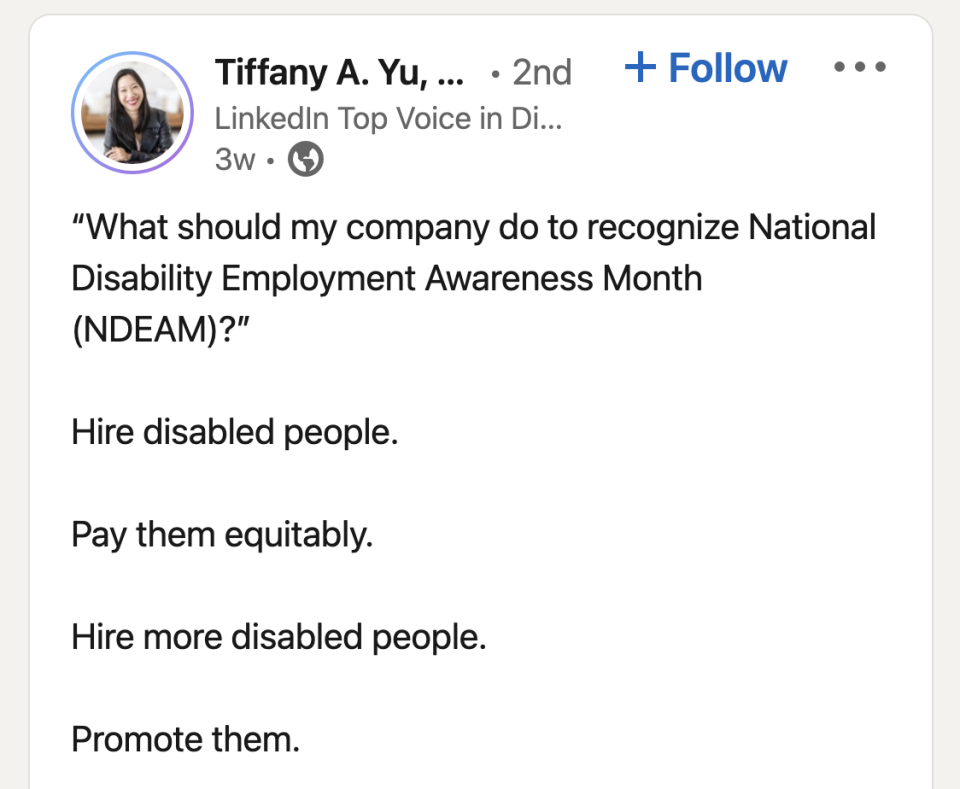
"Diversability® is entirely run and led by disabled people. There are 9 of us. And our former team members (also all disabled) have gone on to win awards and scholarships and get their dream jobs and internships. Disability employment works."
3.Morgan Baker, Games Accessibility Lead at EA, shared some etiquette tips for talking with Deaf and hard of hearing colleagues. "First and foremost, we are not one collective experience. Some people have residue hearing, others do not. Some use hearing devices, others can’t or choose not too. It’s not just a hearing 'medical' spectrum, but also derives from upbringing, culture, and personal experiences. So what can you do?"
![<div><p>"[1] Face the person and use a normal tone and natural pace. If you must, focus on your enunciation.If asked to speak louder, speak louder. If asked to slow down, slow down. But starting out as 'normal' can help us guide you, if needed.[2] Make sure you have the person’s attention.If you are speaking and we are not focusing or aware, we won’t hear you. You can get our attention by tapping our shoulder, flagging us with a wave, flickering lights, tapping a table… the list goes on 🙂[3] If an interpreter is present, speak directly to us, not the interpreter.And don’t use phrasing like, “tell him I like his shirt” since it not only makes interpreting harder, but also makes the conversation less natural.The interpreter may troll & translate literally 😉[4] When in doubt, ask how to best communicate!Some prefer to write or type, whereas others prefer to use gesture and body language. It’s all context dependent and involves individual preference.Relax & ask! And never be afraid to get flexible with communication. ♥️"</p></div><span> Morgan Baker/LinkedIn / Via <a href="https://go.redirectingat.com?id=74679X1524629&sref=https%3A%2F%2Fwww.buzzfeed.com%2Fmeganeliscomb%2Fdisability-employment-awareness&url=https%3A%2F%2Fwww.linkedin.com%2Ffeed%2Fupdate%2Furn%3Ali%3Aactivity%3A6982830266000060416%2F%3FupdateEntityUrn%3Durn%253Ali%253Afs_feedUpdate%253A%2528V2%252Curn%253Ali%253Aactivity%253A6982830266000060416%2529&xcust=6339263%7CBF-VERIZON&xs=1" rel="nofollow noopener" target="_blank" data-ylk="slk:linkedin.com;elm:context_link;itc:0;sec:content-canvas" class="link ">linkedin.com</a></span>](https://s.yimg.com/ny/api/res/1.2/5.W8Jm5DH7lMZi6e_fnl_Q--/YXBwaWQ9aGlnaGxhbmRlcjt3PTk2MDtoPTU4OA--/https://media.zenfs.com/en/buzzfeed_articles_778/78b3805b809c3feba4fe45dcb94961b7)
"[1] Face the person and use a normal tone and natural pace. If you must, focus on your enunciation.If asked to speak louder, speak louder. If asked to slow down, slow down. But starting out as 'normal' can help us guide you, if needed.[2] Make sure you have the person’s attention.If you are speaking and we are not focusing or aware, we won’t hear you. You can get our attention by tapping our shoulder, flagging us with a wave, flickering lights, tapping a table… the list goes on 🙂[3] If an interpreter is present, speak directly to us, not the interpreter.And don’t use phrasing like, “tell him I like his shirt” since it not only makes interpreting harder, but also makes the conversation less natural.The interpreter may troll & translate literally 😉[4] When in doubt, ask how to best communicate!Some prefer to write or type, whereas others prefer to use gesture and body language. It’s all context dependent and involves individual preference.Relax & ask! And never be afraid to get flexible with communication. ♥️"
4.Zane Landin, Communications Specialist and DEIA Rights Advocate, shared how employers can make their hiring processes more inclusive. Landin writes, "The economic recovery from COVID highlighted the persistence of systemic ableism in the workforce, which existed long before the pandemic."
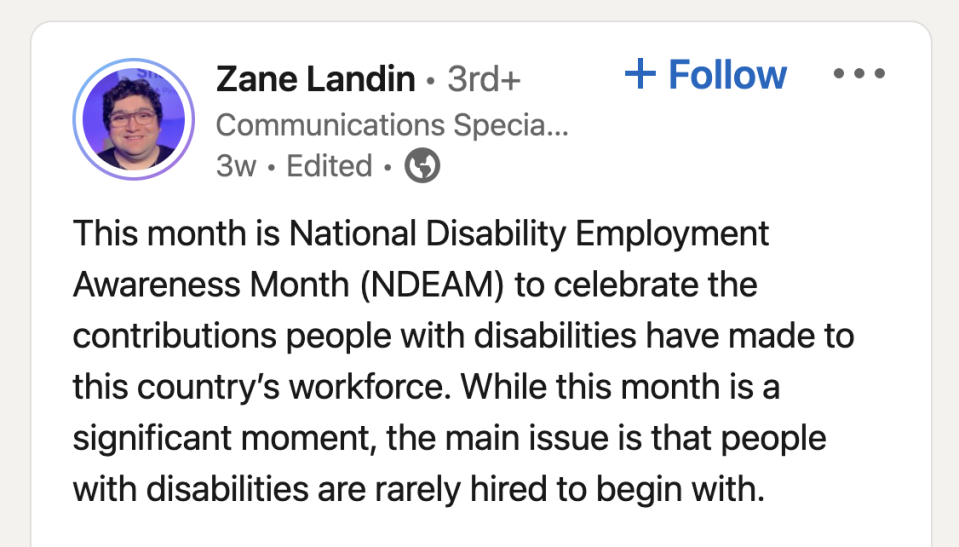
"There are so many things you can do like:
- Change your job description that may be clearly ableist.- Create or improve a universal paid family and medical leave program.- Expand healthcare support.- Raise wages because, historically, people with disabilities have been severely underpaid. - Make it clear that any employee can utilize workplace accommodations, especially those with a disability.- Make considerable advancements to your disability employment programs.NDEAM isn’t only a time to celebrate people with disabilities and their contributions but to prioritize equity and inclusion, so their integral voices are at every level of employment."
5.Ellie Middleton, an Autistic and ADHD Activist, shared some ways people can alter their communication to make their workplaces more equitable for autistic employees. Middleton writes, "Friendly reminder that acknowledging that someone is autistic and actually altering your behavior to accommodate them as a disabled person are two different things."
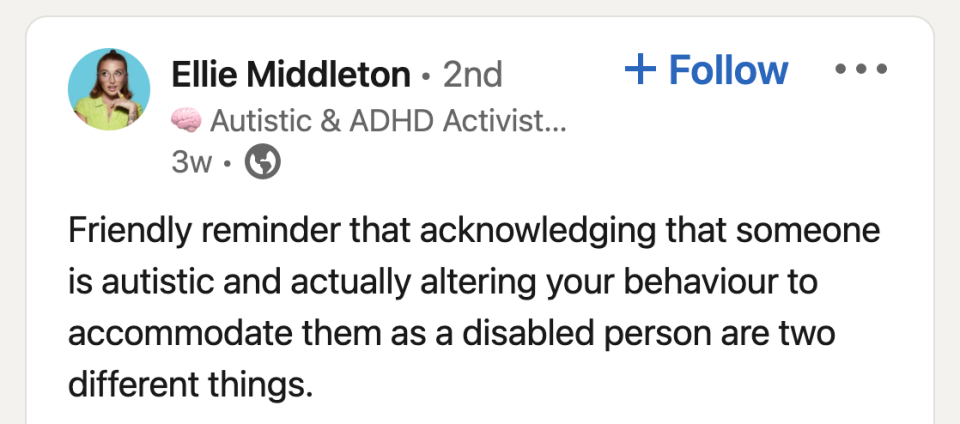
"If you are still:
-Expecting someone to read between the lines-Communicating in an unclear way-Not sharing plans and agendas ahead of meetings-Considering someone to be 'rude' when they communicate in an upfront way-Getting annoyed at people asking 'unnecessary questions'-Not giving people time to process what you have asked of them before saying 'yes'Then you are not doing enough.Accomodation requires ACTION 👏🏼."
6.And finally, Jody Allard, Content Design Director at Pinterest, shared some thoughts on the way we talk about disability. "Disabled isn't a bad word. We're not differently abled, special needs, disAbled, or any other euphemism that makes you less uncomfortable. 'People of all abilities' is the 'All Lives Matter' of disability equity. Don't use it unless your goal is to tell disabled people that NDEAM isn't about us."
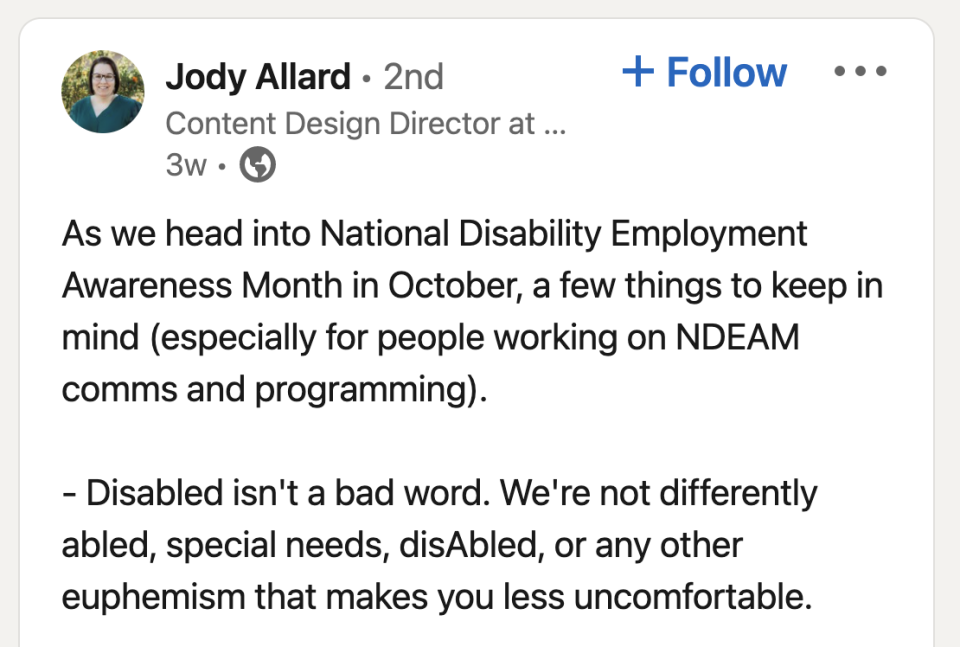
Allard continues with some questions we can ask to determine if our companies are doing enough for workers with disabilities:
"- Are you committed to disabled employees or committed to looking like you're committed to disabled employees? Hint: If you're not currently reporting on disability AND have a plan to increase hiring and retention, you're probably the latter.
- Is your NDEAM programming highlighting disabled employees? Is it empowering disabled people to break down harmful myths? Or is it inspiration porn that further others disabled people?- Do you have programming that specifically addresses the needs of your disabled employees? Sessions around accommodations, accessibility, disability community support, talks from disability advocates, etc? Disabled people and allies have very different needs. Whose are you centering and prioritizing?- Who is leading disability efforts at your company? Do they have lived experience of being disabled? If you can't find someone willing to speak up, your company probably isn't disability-friendly."
